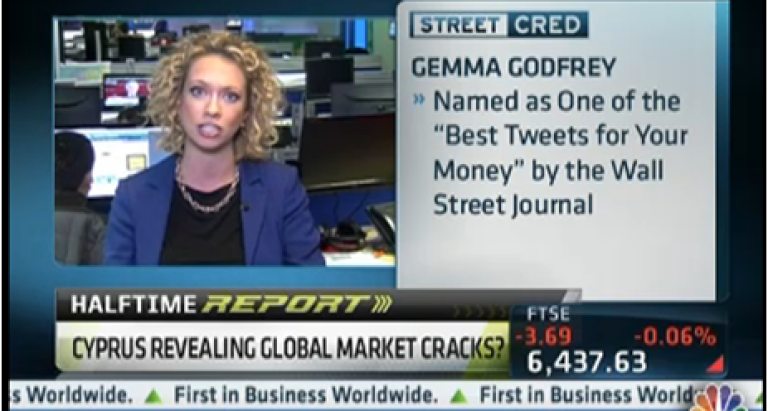With strong words to support the Euro, Mario Draghi, the European Central Bank President, quelled fears over the future of the Eurozone. However, the bailout negotiations in Cyprus revealed cracks in this ‘floor’ supporting the region and markets. A ‘Banking Union’ has been undermined, imbalances within the region magnified and individual systematic risk returned. Divergences within the global banking sector will widen but with the Fed likely to remain accommodative, bullish market sentiment may continue to overshadow concerns elsewhere. Nevertheless, this recent turmoil has highlighted that we’re far from an end to the crisis.
Cracks in the ‘Floor’
Draghi set a ‘floor’ under the markets with his assertion that he would do ‘whatever it takes’ to protect the euro. He launched a bond-buying programme back in the autumn of last year, named the Outright Monetary Transaction, to support this and investors took the news well. Since then, despite political deadlock in Italy, Greece remaining shaky and the growth outlook continually downgraded, markets have remained resilient. So what’s changed?
Troubles in Cyprus have shown that the crisis is far from over and there are key risks left unresolved. As succinctly put by economist Megan Greene, “bond-buying can’t mitigate a run on the banks”. Cyprus has revealed the cracks in the ‘floor’.
The Big Shock – Cash No Longer Safe
The biggest shock from the plans proposed to bailout Cyprus was the threat of loss on deposits, crucially all the way down to the smallest ones. In order to receive rescue funds, government officials wanted to reduce the amount of outstanding debt by charging a tax on deposits. This is a marked departure from the previously enforced strategy of forcing bond-holders to take a ‘haircut’, (loss on their holding), due to their more limited number and therefore the minimal revenue this would have created.
Why was this so strongly rejected and why has this caused such an outcry the world over? Because it could have violated deposit insurance offered to smaller depositors. It would have send out a message that even cash in a bank is no longer safe. The important point is that, rejected or not, officials can’t erase the fact it was proposed and to have even been considered concerns investors that it may return to the fore as a strategy in the future.
Interestingly, the Fed rejected a ‘Cyprus-style’ bailout package back in 1941 on the basis it would be undemocratic. People who have to store more of their money in bank deposits would be harder hit than the rich with more of their wealth elsewhere. Many Cypriot businessmen will have a substantial amount of their hard-earned money wiped out.
Banking Union Undermined
Crucially, the situation has undermined 3 key hopes investors held for the European region. Firstly that a Deposit Guarantee Scheme would at some point come back onto the agenda. This is vital for a return of confidence and support for banks, by encouraging depositors that their cash would be safe in any bank under the region’s banking union. Instead this deal threatened the exact opposite, a violation of deposit insurance with the potential to spark a ‘bank run’ of people moving their money to somewhere perceived to be safer.
Imbalances Magnified and Lending Threatened
Liquidity is therefore the next source of upset. Only since the autumn of last year have investors felt comfortable returning capital to Europe’s periphery country. To put this in context, after at outflow of around €400bn from the start of 2012 alone, the reversal seen in the latter few months of the year amounted to just €100bn. Therefore, a rebalancing of capital still has a way to go and this latest crisis may worsen the situation.
Vital for an eventual end to reliance on rescue funds, banks have looked to wean off ECB funding. Lending to each other would then be the next step towards maintaining adequate liquidity in the banking system. However, institutions can hardly be encouraged to deal in this way in periphery EU countries with the fear of loss so substantial.
Individual Systematic Risk
This leads to the third and final point. The close link between the health of a country and its banking system is being strengthened, when a banking union was hoped to create the opposite. When a country’s banking system is allowed to rock the stability of a country, borrowing costs can spike to unsustainable levels and exacerbate the problem. By uniting the banks so they can be dealt with regionally and separate from specific country risk, it is hoped that these spikes can be minimised. The crisis in Cyprus has shone a light on the lack of unity and individual systemic risk.
Divergences to Widen
So what does this mean for investing? Two interesting outcomes. Firstly, we may see a wider divergence within the banking sector as greater scrutiny over capital adequacy rewards some and punishes other. Funding costs within the periphery are unlikely to ease. Secondly, it casts a severe shadow over the value of stress tests to gauge the safety of investment in a bank. Cypriot banks passed tests in 2011, which raises doubts over the veracity of the Fed’s own investigations which led to 17 out of 18 US banks passing. Optimism in both cases could be argued as too high.
With the Fed likely to remain accommodative, bullish market sentiment may continue to overshadow concerns elsewhere. However, Cyprus has highlighted that we’re far from an end to the crisis.
Gemma Godfrey is Head of Investment Strategy at Brooks Macdonald, a CNBC broadcaster, Board Director and Quantum Physicist by background. Voted the most popular businesswoman on Twitter by AdvisorOne and one of the savviest by the Wall Street Journal, follow Gemma @GCGodfrey and read her views at www.TheInvestmentInsight.com.
